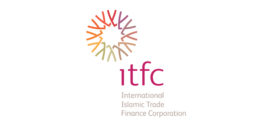UAE ranks second best in its improvement of digital services provided by the government, according to BCG’s 2016 Digital Government Survey
 Dubai, 12 June, 2017 — The United Arab Emirates (UAE) has the second highest net perception of service improvement over the past two years globally and ranks first in terms of the highest levels of satisfaction for services in comparison to the private sector, with 39.5% more UAE citizens using these services more often according to The Boston Consulting Group’s (BCG) 2016 Digital Government Survey. The survey, which was based on 13,570 individual responses across 21 countries and 26 digital government services, benchmarks citizen perspectives on their use of digital channels for government services.
Dubai, 12 June, 2017 — The United Arab Emirates (UAE) has the second highest net perception of service improvement over the past two years globally and ranks first in terms of the highest levels of satisfaction for services in comparison to the private sector, with 39.5% more UAE citizens using these services more often according to The Boston Consulting Group’s (BCG) 2016 Digital Government Survey. The survey, which was based on 13,570 individual responses across 21 countries and 26 digital government services, benchmarks citizen perspectives on their use of digital channels for government services.
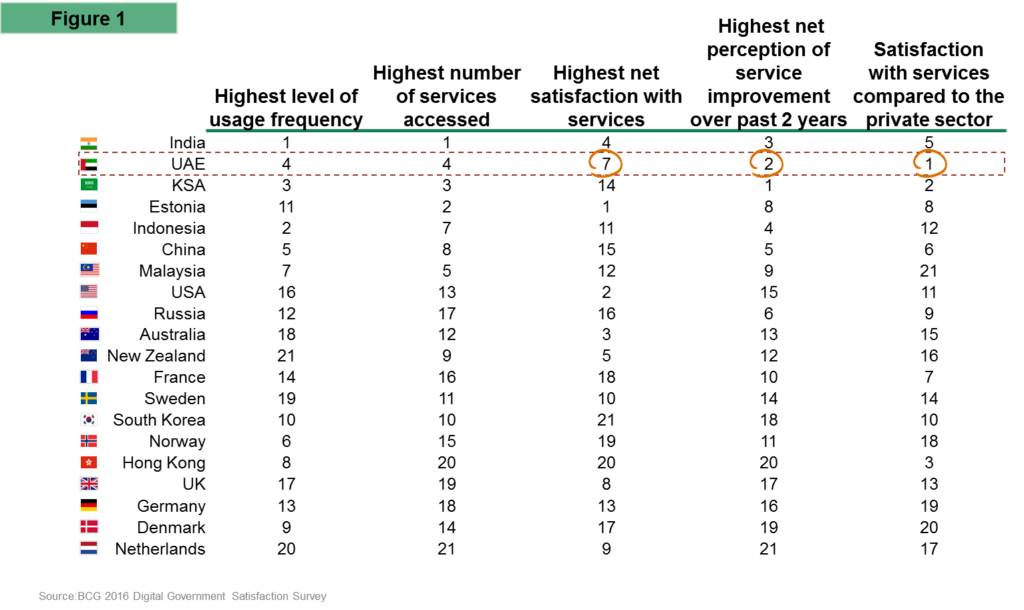
The 2016 survey addressed digital government user access, adoption, satisfaction, privacy and security concerns, and unearthed key trends across all studied areas including frequency of use of digital government services has increased substantially since 2014, with wearable devices having the highest projected use growth amongst all other. Globally, information, taxation, and employment services are most widely used digital government services, and significant improvement in service satisfaction has been noted over the past two years, with some countries making faster strides than others. Millennials, full-time students, lower income brackets and urban dwellers are the least satisfied with e-government services, and concerns over privacy are a leading deterrent for adoption.
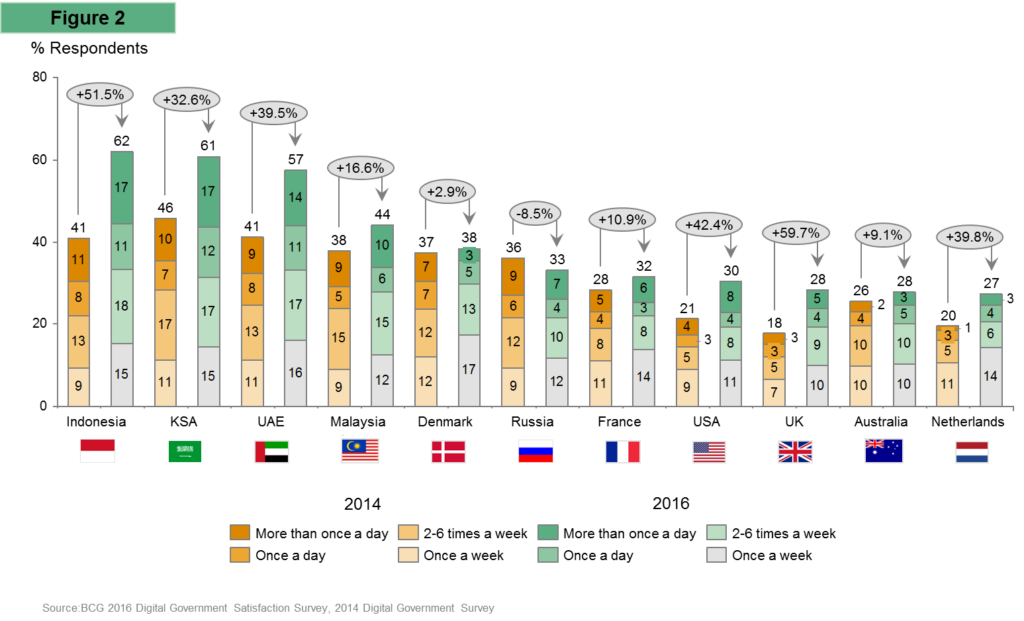
UAE citizens rely more on digital government services
According to the 2016 survey, the UAE has witnessed a high degree of online service adoption with 39.5% more UAE citizens increasingly relying on e-government services and accessing these services across multiple devices. In fact, 89% of users from UAE now use three or more devices to access online services and the weekly use of online government services has increased by 40% since 2014. The most accessed and satisfactory e-government services include job search, information access and taxation, while IP registration and court interactions are least used.

“The proliferation of technology and digitalization of UAE citizens is evident, by the substantial increase of frequency of usage in digital government services when compared to 2014. The adoption of internet services has seen a particular high growth in wearable devices, which mirrors global trends. This points towards the need to advance and increase channels for citizens to access government service,” said Rami Mourtada, Principal and Digital Transformation Lead at BCG Middle East.
UAE is first in the region and fourth worldwide in service satisfaction
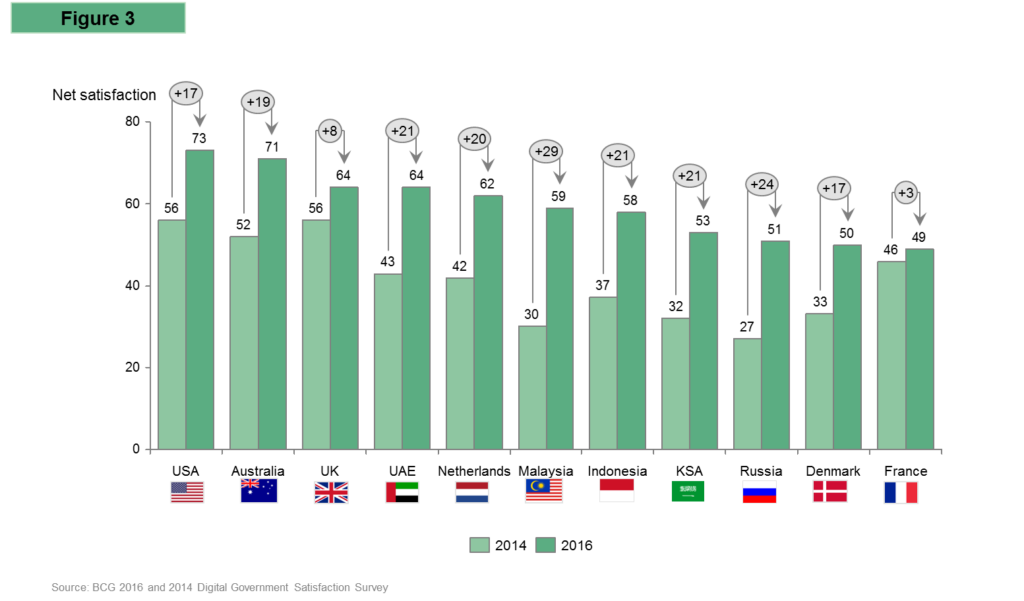
Nine in ten UAE users believe that e-government services have improved over the past two years, with the country’s net satisfaction score improving by 21 points in the same period. The majority of users have experienced significant improvements in service the quality of e-government services, with the public sector vastly improving compared to private sector. These improvements have placed the UAE at the top of the region and the fourth worldwide after USA, Australia and the UK in net customer satisfaction.
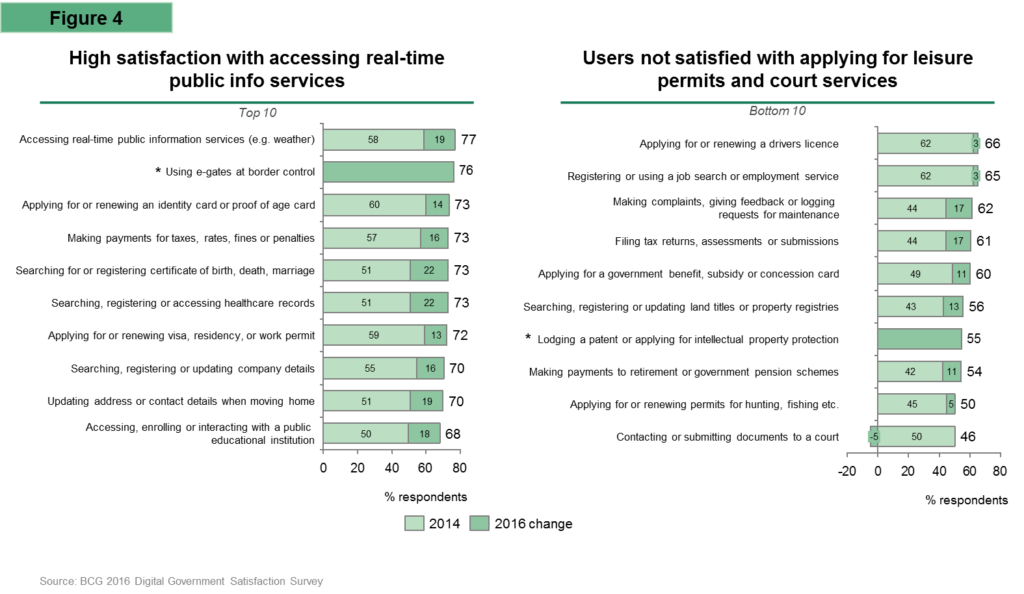
There is high satisfaction when it comes to accessing real-time public information services amongst UAE citizens. The services that ranked highest in terms of satisfaction include accessing real-time public information services (77%) and using e-gates at border control (76%). UAE respondents are most dissatisfied with applying for or renewing a driver’s license (66%) and registering or using a job search or employment service (65%).
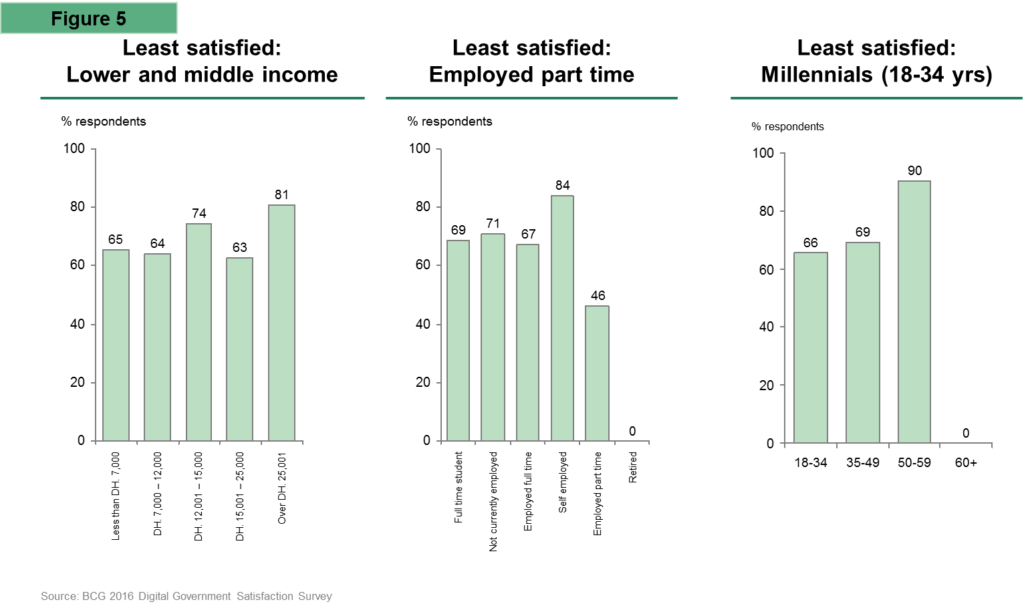
Young, low-income and part-time employed UAE respondents are the least satisfied customers of digital government services.
User Experience (UX) continues to fall short of the majority of UAE citizen’s expectations
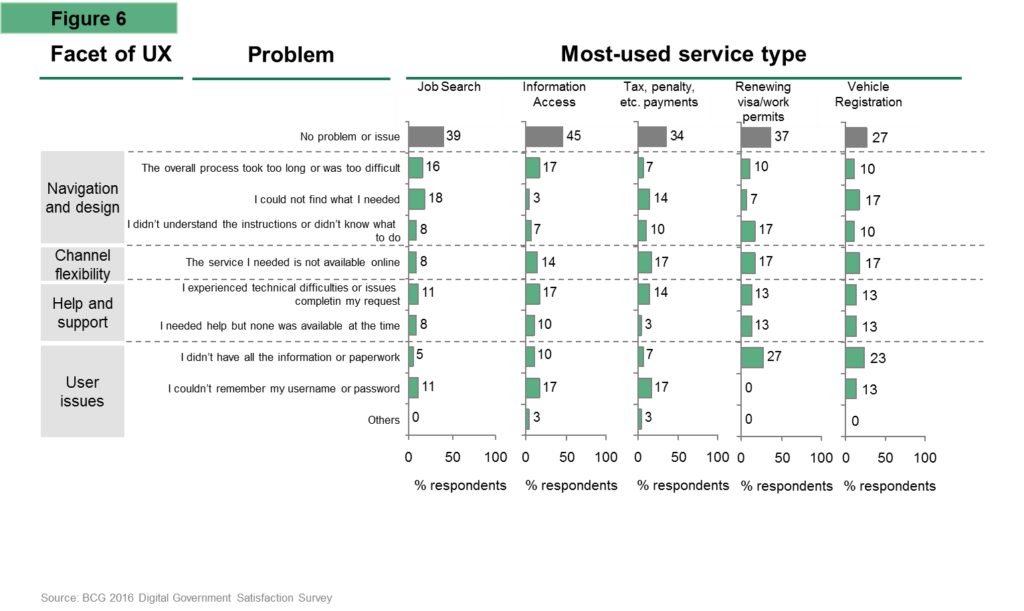
In general, UAE users are satisfied with digital services across attributes, and no single service seems to be associated with presenting the most problems; having said that, 73% of UAE users faced a problem while using e-government services. The most pressing concerns for surveyed citizens were that the service they needed was not available online, the overall process was too long or difficult and they could not find what they needed. Among the most-used services, respondents faced the most problems with vehicle registration, with 23% stating they did not have all the information or paperwork required.
Users are comfortable sharing personal information on government digital channels
UAE citizens are comfortable sharing personal information on government digital channels, motivated by efficiency benefits and improvement of services. Theft or loss of information and its misuse are seen as the biggest risk of sharing information digitally. UAE users generally agree with three privacy expectations – there should be an independent regulator enforcing standards around collection and use of personal data, visibility on personal information access by organizations and the ability for citizens’ to seek compensation from organizations who misuse their information.
Key actions for the immediate future
“UAE must put forth key actions for the immediate future to improve its digital government offerings to citizens, and there are four key imperatives to consider. The first is to review the government digital strategy and develop a roadmap to meet demands for digital services; second, develop common standards for digital services across government bodies; third, establish a clear approach to improve satisfaction and perception of digital services across key user segments; and finally, strengthen and promote the regulatory environment overseeing the national digital infrastructure to build digital capabilities across citizen-facing government entities,” concluded Mourtada.
- Review government digital strategy and develop a roadmap to meet the demand for digital services:
The UAE should identify high demand services of the future (independent of current functionality) and understand the gaps and functionality limitations of current digital services to develop a roadmap for the improvement of digitization for existing high demand services.
- Develop common standards for digital services across government, focusing on:
- Decreasing transaction time by decreasing the complexity of digital services and weeding out confusing design to reduce unnecessary steps; as well as improving usability and accessibility for faster and easier to use digital services including a clear design, and smooth user authentication with minimal requests for information.
- Develop an approach to improve satisfaction for and perception of digital services across key user segments including youth, lower and middle income and part time employees:
- Ensure that the services offered are relevant to these segments, provide access to key channels including smart TV, wearables and e-Readers, and communicate the benefits of using digital government services clearly, while simultaneously alleviating fears about user data sharing and security across government entities and services.
- Strengthen and promote a regulatory environment that governs user privacy and user data security, including clear rights for government use and access of citizens data, government oversight of data, individual control over data sharing and compensation or penalties for the misuse of data
Notes to Editors: A copy of the report can be downloaded here.
About The Boston Consulting Group
The Boston Consulting Group (BCG) is a global management consulting firm and the world’s leading advisor on business strategy. We partner with clients from the private, public, and not-for-profit sectors in all regions to identify their highest-value opportunities, address their most critical challenges, and transform their enterprises. Our customized approach combines deep insight into the dynamics of companies and markets with close collaboration at all levels of the client organization. This ensures that our clients achieve sustainable competitive advantage, build more capable organizations, and secure lasting results. Founded in 1963, BCG is a private company with 86 offices in 49 countries. For more information, please visit bcg.com.
 Cash And Trade Magazine For Cash and Trade professionals in the Middle East
Cash And Trade Magazine For Cash and Trade professionals in the Middle East




